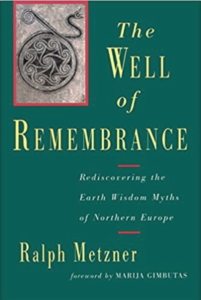The Well of Remembrance: Rediscovering the Earth Wisdom Myths of Northern Europe by Ralph Metzner
The Well of Remembrance: Rediscovering the Earth Wisdom Myths of Northern Europe
Author: Ralph Metzner, Shambhala Press, 1994

The Well of Remembrance
I picked up this book at Moe’s Books in Berkeley one quiet afternoon. I was not familiar with Metzner’s work, but the title intrigued me, so I bought it. The majority of the text is written by Metzner, with a few chapters contributed by Bärbel Kreidt, Norbert Mayer, and Christian Rätsch. Published in 1994, this book is very much a product of its time, and has not aged well. The text also has some inaccuracies and omissions which make it difficult to take the work seriously as a whole, although the parts where he discusses psychology are interesting, and his discussions of the need to address social ills are unfortunately still relevant.
A psychologist and (now retired) professor of psychology, Metzner quotes Jung extensively, as well as the usual sources—Tacitus, Saxo Grammaticus, and Snorri Sturluson. He also name-checks Marija Gimbutas, who wrote the foreword to the book shortly before her death.
Like many (white, male) authors, he has much to say about Freyja, who is mentioned on 30+ pages, as well as having an entire chapter of her own. However, Frigg is mentioned all of three times: once as “Odin’s wife and Balder’s mother”, once in the story of the mistletoe, and once in this dismissive summary on page 154: “Frigg is a form of Freyja, adapted and adopted into the patriarchal family structure of the Aesir gods.”
Compare this to the author’s rhapsodic descriptions of Freyja, coming to this summary (also on page 154): “Freyja and Odin came to be regarded as divine consorts, guides, and teachers of sorceresses and seeresses.” But Frigg, Allmother and Queen of Asgard, merits only three references, and is easily dismissed as merely an aspect of Freyja. The objectification and erasure is infuriating, and sadly, not atypical. (The winner in this particular category is Paul Rhys Monfort, who in his book Nordic Runes dismisses Frigg as “Odin’s rather less glamorous wife” while spending entirely too much time describing how attractive Freyja is.)
Three times, Metzner refers to one or more of Loki’s children—Hel, Fenris, and Jormundgand, and he refers to them as the offspring of Loki “and a giantess” (when he bothers to mention their mother at all). Her name is Angrboda, and that information is easy to obtain, so why he couldn’t be bothered to include her name really bothers me. Even if I were not one of her devotees, the omission of her name and the subsequent erasure is offensive to me as a woman. Three times. That’s not an accident, that’s an intentional choice. Montfort does the same, refusing to name Angrboda and simply referring to her as “a giantess”. Why is it so hard to use her name?
Then there’s the attempting-to-be-polite Othering of the Jotnar that rounds out the work. His discussion of the giants sounds like a your clueless white friend who insists that they can’t be racist because “I have a black friend”. Having spent chapters discussing the divinity and general wow-ness of the Aesir and Vanir, he presents the giants on page 205: “think of the giants as nonhuman forces and agencies that are not unconscious, but that have a consciousness that is different in quality and scale from human consciousness.” Just like the Aesir and Vanir; like, gosh, what distinguishes gods and humans? But the Jotnar do not have the general wow-ness that the other gods do, so they are merely giants, and not gods. Unlike Montfort, at least Metzner does not cast them as evil stereotypes, but he doesn’t do much to make the reader curious about them in any positive way.
Then there’s this error on page 257: “The ancient Europeans believed that an ocean serpent, named Midgard, surrounds the Earth island.” Oh, surely that must be a one-off error, thought I. Oh, no, it’s not. Every reference to “the great serpent” is by the name “Midgard”. The name “Jormundgand” never appears in the book. Seriously. Did anyone who actually knows Norse mythology do a beta read on this book? I’m guessing not.
Lastly, the self-indulgent tone of the personal experience pieces—as well as Metzner’s constant interjection of himself into what would be (and should be) a direct statement becomes tiresome. Page 247 holds one such example, as Metzner is going on about Ragnarok and the Volúspa, and gifts us with this sentence: “According to the tradition, both seers and poets were ecstatically inspired by Odin—as I have been myself.” That’s nice, dear, but what does your ecstatic inspiration have to do with the Volúspa? We’re discussing Ragnarok here.
Writing and researching this book was clearly a profound personal journey for Metzner, but that aspect should have been separated out into another book. The lack of balance between personal and universal in the book makes it difficult to appreciate either Metzner’s specific experiences or the larger ideas he presents.
The book is not a total loss. Metzner’s discussions of psychology and social ills could be the basis of a different (and much more interesting book). His prior and subsequent books are in the fields of psychology and ecology, which are more aligned with his strengths. I wish this had been the book the title promised. The book is not particularly interesting, regardless of whether the reader is familiar with the Norse mythos; the inaccuracies and exclusions detract from the content, and the reader is advised to approach this book with the understanding that it’s very much a personal approach rather than reference material.
